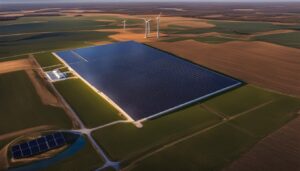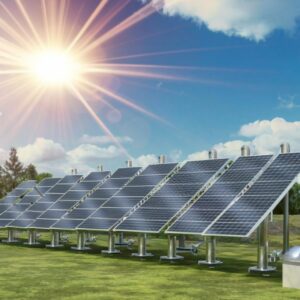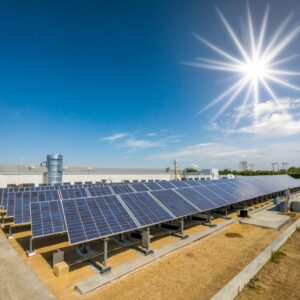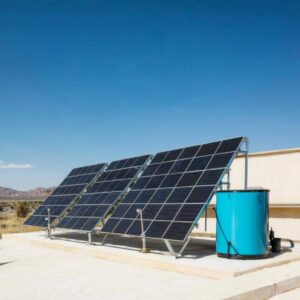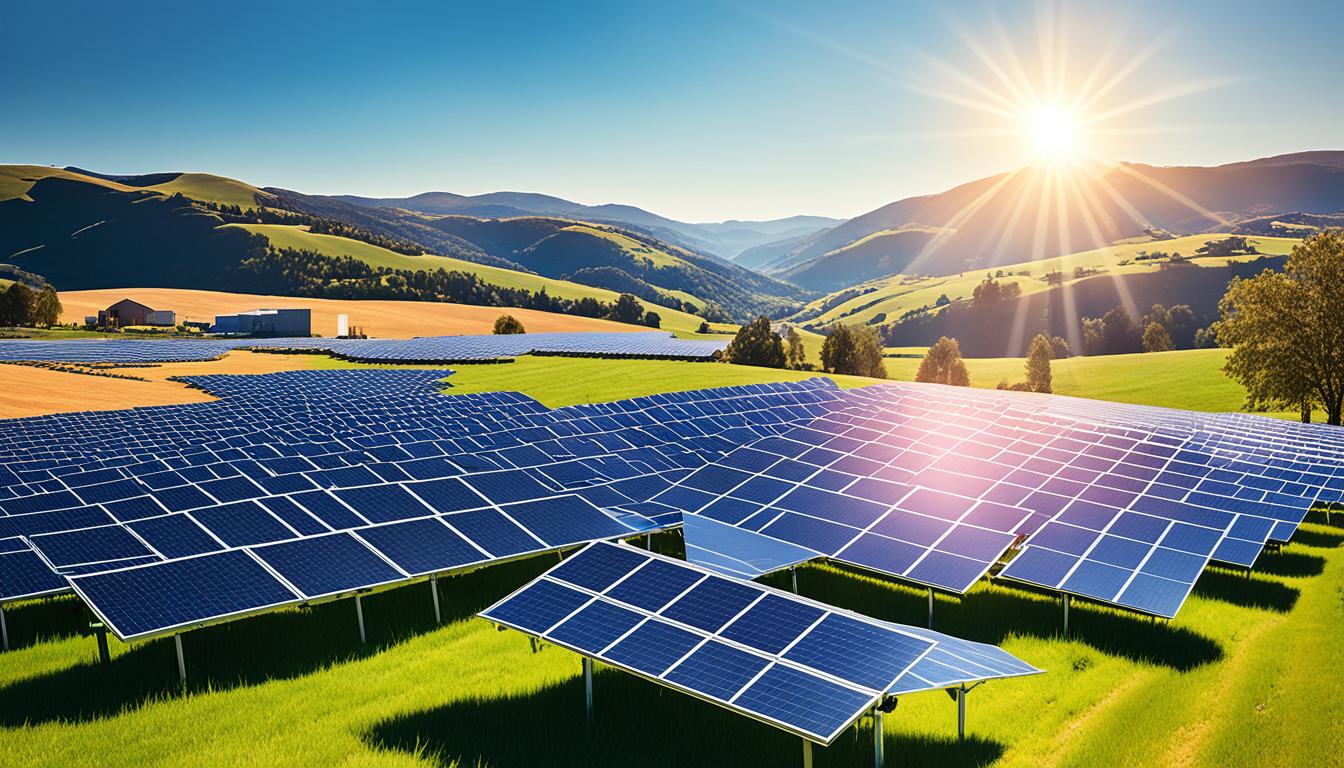
As a journalist writing about solar energy production, I am fascinated by the innovative ways we can harness the power of the sun. Solar energy has become increasingly important in our efforts to transition to cleaner and more sustainable sources of electricity. In this article, we will explore the process of solar energy production, its benefits, and the exciting developments in the field.
Key Takeaways:
- Solar energy production utilizes solar panels or photovoltaic cells to capture and convert the sun’s energy into usable electricity.
- Solar energy is a renewable source, constantly replenished by the sun, unlike non-renewable fossil fuels.
- By harnessing solar energy, we can reduce our carbon footprint and mitigate the effects of climate change.
- Solar energy production offers energy independence and can lead to long-term cost savings.
- The development of durable electrodes for hydrogen production from seawater using solar energy holds promise for renewable energy production.
The Process of Solar Energy Production
Solar energy production involves the use of solar panels or photovoltaic cells to capture the sun’s energy and convert it into usable electricity.
Solar panels are made up of multiple photovoltaic cells, which are composed of semiconductor materials, typically silicon. When sunlight hits the solar panels, the photons in the sunlight excite electrons in the semiconductor material, creating an electric current.
This current is then captured and converted into usable electricity. The efficiency of solar panels in converting sunlight into electricity has been improving over the years, making solar energy production more effective and cost-efficient.
Photovoltaic cells are the key components in solar panels that enable the conversion of sunlight into electricity. These cells are made of layers of different materials, such as silicon, that have the ability to absorb photons and generate an electric current.
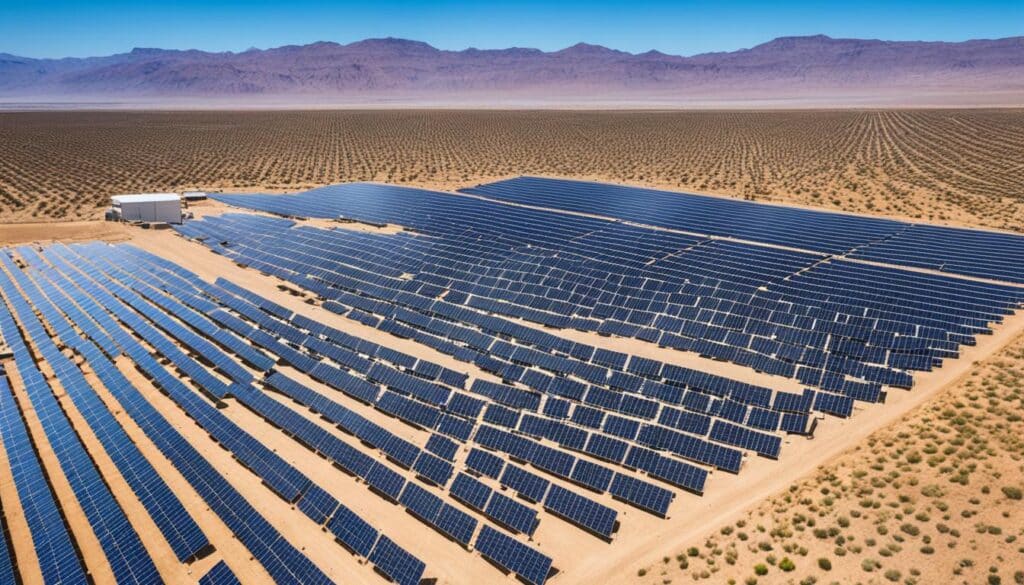
“Solar energy production involves the use of solar panels or photovoltaic cells to capture the sun’s energy and convert it into usable electricity.”
The Benefits of Solar Energy Production
Solar energy production offers numerous benefits, making it an attractive source of electricity. First and foremost, solar energy is renewable, meaning it is constantly replenished by the sun, unlike fossil fuels which are finite resources. This makes solar energy a sustainable and long-term solution for meeting our electricity needs.
Solar energy is also clean and emits no greenhouse gases during the production of electricity. By harnessing the power of the sun, we can significantly reduce our carbon footprint and contribute to mitigating climate change. Choosing solar energy as a clean alternative helps preserve our environment for future generations.
Additionally, solar energy production provides energy independence. Individuals and communities can generate their own electricity, reducing reliance on the traditional power grid. This not only increases self-sufficiency but also ensures a more stable and reliable energy source, especially during times of power outages or natural disasters.
Moreover, solar panels can be installed on rooftops or open land, utilizing available space efficiently. This helps reduce the need for additional infrastructure and land use, preserving natural habitats and landscapes. Furthermore, solar energy production can lead to long-term cost savings. Once installed, the fuel source (sunlight) is free, and maintenance costs for solar panels are relatively low. This makes solar energy an economically viable option for individuals, businesses, and communities.
In conclusion, solar energy production offers numerous benefits, ranging from its renewable and clean nature, to the ability to provide energy independence and cost savings. By harnessing the power of the sun, we can create a sustainable and environmentally friendly future for generations to come.
FAQ
Can solar energy be used to produce hydrogen from seawater?
Yes, researchers at the University of Tsukuba have developed highly durable electrodes that allow for direct hydrogen production from seawater using solar energy.
How long can the electrodes sustain anode performance?
The multi-elemental alloy electrodes can sustain anode performance for over a decade when powered by solar energy, according to the research conducted by the University of Tsukuba.
What is solar energy production?
Solar energy production involves capturing the sun’s energy using solar panels or photovoltaic cells and converting it into usable electricity.
How do solar panels work?
Solar panels are made up of multiple photovoltaic cells, typically composed of semiconductor materials like silicon. When sunlight hits the solar panels, the photons in the sunlight excite electrons in the semiconductor material, creating an electric current that is then captured and converted into usable electricity.
What are the benefits of solar energy production?
Solar energy production offers numerous benefits, including being renewable, clean, and emitting no greenhouse gases. It provides energy independence, reduces reliance on the grid, and can lead to long-term cost savings. Additionally, solar panels can be installed on rooftops or open land, making use of available space and reducing the need for additional infrastructure.


